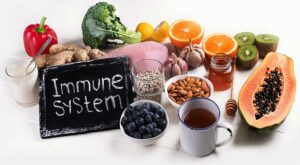Do You Struggle With PCOS? – [Video]
Do you struggle with PCOS? The solution is a natural one.
What you will learn about
Excerpt:
PCOS (Polycystic ovary syndrome) affects about 20% of women of child-bearing age. Symptoms of PCOS include infertility, cysts on the ovaries, hair loss (male pattern baldness), facial hair, weight gain and more.
In this video, we review exciting research that truly uncovers the root cause of PCOS, excluding the use of the dangerous drugs so often prescribed.
Video transcript:
Do you have PCOS? 20% of women of childbearing age have it. I would estimate that’s who’s diagnosed. I would say there’s probably a subclinical population that’s quite a bit higher than that.
It’s associated with:
- Having cysts on your ovaries;
- Having trouble with infertility because you don’t ovulate;
- Losing your hair and developing male patterned baldness.
Interestingly, the root cause of this problem also affects men and the fact they’re sort of turning into women, if you will, having too much estrogen, while the female PCOS is associated with too many androgens — testosterone in the case of women.
PCOS: The research
We understand the symptoms… I wanted to talk to you today about a paper I’m going to read. It is out of Biomedicine, and it’s titled: “Metabolic and Molecular Mechanisms of Diet and Physical Exercise in the Management of PCOS“.
What’s exciting about this is, it’s really getting to the true underlying root cause of PCOS, rather than just managing the fact that a woman has these higher levels of hormones that are causing infertility, non-ovulation, male pattern baldness, cysts on the ovaries, and putting them on birth control, putting them on a drug called spironolactone, sometimes putting them on Metformin… All medications with attendant side effects.
And then a woman having to spend $30K-$40K to deal with their infertility, instead of standing back and saying: “What is the underlying root cause of this condition?”
That’s what I want to talk about today. And it’s actually very exciting.
PCOS: The root cause
Basically, the underlying root cause is poor metabolic health and insulin resistance.
Insulin resistance comes about because here in the United States, and in several other industrialized nations, we have a terrible diet: highly processed foods, high sugar, fast food… This type of diet is leading to insulin resistance.
So are lack of exercise, poor sleep, a lot of stress.
If you’re nodding going, “Yeah, that’s me, I don’t sleep well, I’m under a lot of stress. My diet’s not great, I don’t get enough exercise”… You’re in very good company, but it’s not healthy company.
And specifically we’re talking about PCOS in our young women of childbearing age. This is a formula for disaster because the things I just mentioned elevate your glucose, which elevates your insulin, and what does that lead to?
PCOS: The effects
It leads to a lot of different problems. We could be talking about heart disease, diabetes, cognitive decline later in life, like Alzheimer’s. We could talk about cancer. It is so interesting that it’s the same root cause of so many of the degenerative diseases we do not want to get.
The solution is not that hard because they have the same underlying root cause.
But we’re talking about PCOS. What happens when you have that elevated insulin? Very specifically, and what this paper went over, PCOS elevates an enzyme that just drives the manufacturing of what’s called androgens, excess androgens in women — DHA and testosterone.
Now we’re supposed to have DHA, we’re supposed to have some testosterone, but not to such an excessive extent that our ovaries are no longer ovulating, producing an egg every month, and we have so much testosterone we’re getting male pattern baldness and all the things we just discussed. It’s women turning into men.
What’s fascinating about this is the same cascade of poor diet, not enough sleep, stress… elevates the exact same enzyme in men, but in men it causes an increase of estrogen.
So, you are penalized, whether you’re a male or a female, for this poor lifestyle and diet. You are absolutely penalized in what your hormones are doing. What that leads to? Men get the big bellies. They can develop breast tissue. They have erectile dysfunction. They’re infertile. I mean, it takes two, the natural way, it takes two and we want our men to be fertile. We want to be fertile if that’s what we’re interested in.
But remember, it’s not just about making babies. Having balanced hormones gives one a feeling of well-being and cognitive balance, good energy, you’re building muscle, not fat. There’s a whole lot of reasons to have balanced hormones.
So we have high insulin increasing this particular enzyme that, then, is offsetting the hormones of women and men alike.
PCOS: Obesity and leptin
The other interesting thing is that obesity is associated with insulin resistance or lack of insulin sensitivity. And it turned out that 97% of women who are obese have the PCOS. This combination of PCOS and obesity and 97% of the women suffering, this is a formula that is very common.
Now, with obesity, we have increased fat cells. Now, fat cells are not just lying there, innocently going “Here I am“. No, they do a lot of negative things: One is they produce hormones, but bad hormones. One hormone is called leptin. Now, leptin is really obnoxious because it makes you feel hungry all the time, even though you have weight to lose. Very unfair, very frustrating. I talk to a lot of my patients who have weight to lose, and they’re like “I’m never satisfied, I’m always hungry”.
And that’s this really evil hormone leptin — which we can get under control, so don’t worry about that — but it still is very, very frustrating to just eat, knowing you’ve eaten enough but you’re not satisfied, you need more. But leptin does something else: it decreases a very important immune cell. And this is called your t-regulatory cell.
PCOS and the immune system
REGULATE: think about it that way to remember it. What these cells do is they make sure your immune system understands friend from foe. What is your immune system supposed to do? It’s supposed to kill the bad guys, right? There’s a bacteria, there’s a virus, there’s a cancer cell. Attack, attack, attack, go get the bad guy.
Autoimmune disease and PCOS are connected.
What is autoimmune disease? Your immune system is attacking self. It’s very common to have Hashimoto’s, thyroiditis. That’s the autoimmune thyroid disease associated with PCOS. And here’s the connection. Now, Hashimoto’s happens to be the most common autoimmune disease — there can be others, but that one is extremely common — associated with PCOS. And now we’re seeing why.
You have these T-regulatory cells that are decreased because of the excess fat cells… Leptin decreases their production, and you need these t regulatory cells to say: “Oh, no, no, no, don’t attack the thyroid. That’s us! That’s not them, that’s us!” And, but it’s decreased because of the leptin, because of the excess weight, because of the excess fat cells. And then there’s nothing to suppress that attacking self. So what happens? An autoimmune disease develops.
Now [let’s talk about] treatment, let’s get to the good part. Diet is incredibly important. In other words, your lifestyle choices, real food, not sugar, not processed food, not fast food. And if you’re just like, “Oh, forget about it“, it’s not that hard. I’ve got to tell you, it’s not that hard. Yes, you need some help, you need some direction, I get it. But it’s so worth it. It is so, so worth it. And the body is very appreciative.
PCOS: The solution is natural
We’re trying to get that excess insulin down. We’re trying to get the weight down that comes along with it. Not doing stupid things to lose weight, but doing intelligent rebalancing, and then the weight-loss comes along with it. We’re lowering that insulin. We’re lowering the inflammation, all these things we talked about. Getting proper sleep, intermittent fasting.
Fasting

A lot of people go up to 20 hours of fasting. The research doesn’t support that. The long-term research says 12 to 14 hours. And then beyond 14, you’re getting into the window of affecting your gallbladder, affecting your heart. This is Dr. Longo’s work. He’s been looking at this for a very long time.
So until that changes, I’m sticking with my 12 to 14 hour fast.
Exercising
What else can you do for treatment of PCOS? Exercise. Get moving. Find something that makes you happy. Even if it doesn’t make you happy at first, it will make you happy as you get used to it.
Resistance training… You want to move the body, you want to increase circulation, that helps a tremendous amount. And honestly, it’s hard to get insulin resistance under control if you’re completely sedentary. It doesn’t go along with optimal health, unfortunately.
It can start with walking. There’s a lot of great videos, they have great music and just get you going. Exercise is very key.
Sleeping well

If there is a lot of imbalance, that goes to gut health with maybe the poor diet that you’ve done historically… maybe antibiotics.. maybe certain medications you’ve been on. It’s really created an imbalance in what we call the “microbiome” where all the 38 trillion organisms are.
And we need to rebalance that in order for you to get the good quality sleep that you want. I’m giving you some general things that you can do if you just go “Wow, I’m just terrible getting myself to bed“. I hear that all the time. It’s like, “Well, I just get busy at night and I don’t all, I don’t, I don’t like to go to sleep“. And honestly, I’m the same way. I don’t like to go to sleep either. I wish I could just change out the battery pack, but we need to sleep!
Whether it’s a discipline point, and you get some white noise; you get a sleep mask so that you’re in darkness; you’re not eating 2-3 hours before bed (3 is ideal), so you’re not going to bed with a full stomach; you stop water several hours before bedtime so you don’t have to get up to urinate at night… If you’re doing all these sleep hygiene techniques and that’s not enough, then reach out to us so we can help with the next step of why there’s inflammation in the gut as far as your immune system is concerned.
And then, coming full circle — PCOS our topic for today with the hormonal imbalance — hormonal imbalance can offset sleep. You get in a little bit of a catch-22, but we can fix it. It’s not that hard.
Supplements

All of those things obviously happening at night.
Vitamin D is fat soluble — it would be unusual that you would eat an evening meal that didn’t have some fat, so that helps with absorption.
Also, magnesium. Magnesium helps with sleep. It also helps with insulin sensitivity. Another good one at night. It’s very relaxing. And another mineral in this case (vitamin D being a vitamin, but it’s actually a hormone). Magnesium is very commonly deficient in Americans.
Let me check my list.
Cold showers
Oh, last one: a cold plunge! I’m not brave about this, I’ll be perfectly honest. But a cold plunge: ending your shower in the morning with cold water, or a tub of cold water… it’s actually really great for your immune system. It kind of wakes up the good fat cells versus the bad inflammatory fat cells.
An invitation
These are all the things you can do. But I think this work is very, very exciting as far as what it revealed for a root cause problem, because PCOS underlies so many of the issues that women are having. And remember the same root cause is causing imbalance in men as well, which I find fascinating.
If you like this, please give it a thumbs-up. I’d love to hear your response. I’d love to hear what you’ve been running into with PCOS and the treatment and how you felt. We have great success with it here at Root Cause Medical Clinic, and we’d be delighted to help you. You can reach out for a consultation through our website.
Root Cause Medical Clinic: A holistic and natural approach
The pluri-disciplinary medical approach of the Root Cause Medical Clinic team seeks to uncover the root cause from which stems ill health or malfunction. Our medical team develops a personal program designed to bring you back to good health naturally.

If you have PCOS, there is a root cause for it. Let’s find it.
Our clinicians share the same philosophy on healthcare. Their combined experience in functional medicine, nutrition and dietetics, physical therapy and chiropractic helps you heal faster.
Root Cause Medical Clinic is located in Clearwater, FL, at Ft Harrison Ave. and Magnolia.
If coming to our clinic for a consultation is not convenient, we also offer telehealth medicine services in a number of states. If you live in another state, please call us to see if we can serve you.
Additional resources:
Dr. Vikki on autoimmune diseases
Read Dr. Vikki Petersen’s new book: Hiatal Hernia Syndrome
Symptoms of PCOS
Cause of PCOS

